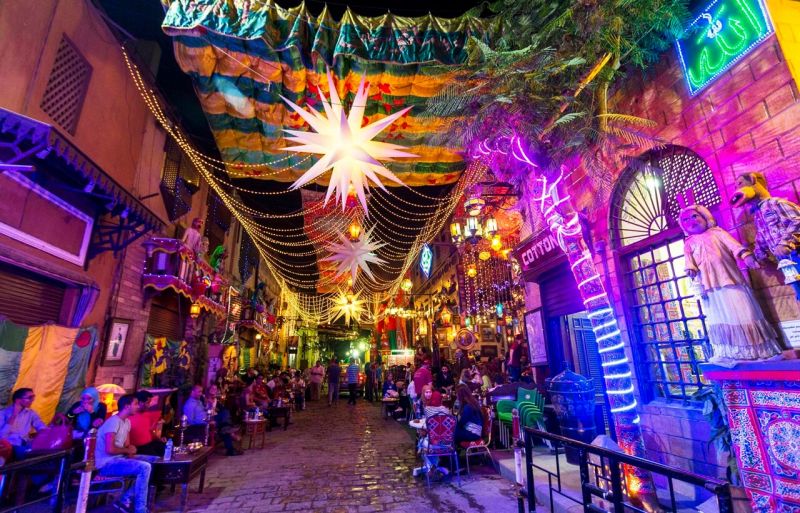Egypt holidays and traditions reflect a rich blend of ancient customs, Islamic heritage, Coptic Christian practices, and modern national pride. From religious festivities that bring streets to life, to centuries-old customs that continue in family homes, Egypt offers a vibrant calendar of cultural expressions that captivate locals and visitors alike. Many travelers explore these cultural insights through Egypt travel information and guides available online.
National Holidays in Egypt
Revolution Day (July 23)
One of the most important national holidays in Egypt, Revolution Day commemorates the 1952 revolution that ended monarchy rule. Marked by patriotic songs, flag displays, and official ceremonies, this day is a moment of unity and reflection on national identity.
Sinai Liberation Day (April 25)
Sinai Liberation Day celebrates the final withdrawal of Israeli forces from the Sinai Peninsula in 1982. Egyptians celebrate this occasion with parades, speeches, and educational programs across schools and TV.
Armed Forces Day (October 6)
This day honors Egypt’s military victory in the 1973 October War against Israel. A powerful expression of Egyptian pride, Armed Forces Day includes military parades, documentaries, and public honors.
National Police Day (January 25)
Coinciding with the 2011 revolution, National Police Day celebrates the role of police officers in defending Egyptian sovereignty. It’s both a tribute to law enforcement and a marker of political history.
Religious Celebrations in Egypt
Ramadan and Eid al-Fitr
A pillar of Egypt holidays and traditions, Ramadan is a holy month marked by fasting, charity, and reflection. Streets glow with lanterns (fanoos), and the atmosphere is festive. The culmination is Eid al-Fitr, a joyful celebration filled with prayers, feasts, and gift-giving. Many visitors enjoy exploring Islamic Cairo during this vibrant month.
Eid al-Adha
Also known as the Feast of Sacrifice, Eid al-Adha commemorates Prophet Ibrahim’s willingness to sacrifice his son. Families sacrifice animals, distribute meat to the needy, and gather in large prayer congregations. It’s one of the most widely observed Egypt holidays and traditions.
Coptic Christmas (January 7)
Egypt’s Coptic Christian community celebrates Christmas with prayers, midnight masses, and traditional foods like fattah. The streets of Cairo and Alexandria glow with lights and decorations, reflecting the festive spirit. For many, historic Coptic Cairo becomes a focal point of celebration.
Sham El-Nessim
An ancient Egyptian spring festival celebrated on the Monday after Coptic Easter, Sham El-Nessim is a national holiday observed by all Egyptians. People picnic in parks, eat salted fish (feseekh), and celebrate nature’s renewal.
Cultural Traditions That Define Egypt
Weddings and Henna Nights
Egyptian weddings blend tradition and festivity. Henna nights, typically held for the bride, include music, dancing, and the application of henna tattoos — an enduring Egyptian tradition.
Religious Observances
Many households maintain traditions like the nightly iftar during Ramadan or the ziarat (visits) to shrines of saints. These practices remain central to Egypt holidays and traditions. Travelers often combine cultural experiences with Cairo day tours to explore historic neighborhoods.
Traditional Clothing and Music
During national and religious celebrations, Egyptians often wear traditional garments like the galabeya. Music — from classical Egyptian to folk instruments like the rababa — plays an essential role in festivals and ceremonies.
Egypt Holidays and Traditions in Modern Times
Today, Egypt holidays and traditions remain deeply woven into the cultural identity of the nation. While cities embrace modern lifestyles, traditional values and customs are preserved and passed down. Even among younger generations, national holidays and religious observances continue to inspire pride, reflection, and a strong sense of community. Articles like Egypt holidays and traditions help document and celebrate this heritage.
Frequently Asked Questions about Egypt Holidays and Traditions
Q1: What are the most important national holidays in Egypt?
Revolution Day, Sinai Liberation Day, Armed Forces Day, and National Police Day are among the most important national holidays. These days celebrate pivotal moments in modern Egyptian history, which many visitors learn about when exploring Cairo attractions.
Q2: How do Egyptians celebrate religious holidays like Ramadan and Eid?
During Ramadan, Egyptians fast from dawn until sunset and gather for nightly feasts. Eid al-Fitr and Eid al-Adha are celebrated with prayers, feasts, family gatherings, and charitable giving.
Q3: What is Sham El-Nessim and how is it celebrated?
Sham El-Nessim is a spring festival that dates back to ancient Egypt. It’s celebrated with outdoor picnics, colorful clothing, and traditional foods like salted fish and onions.
Q4: Are Egyptian holidays based on the lunar or solar calendar?
Islamic holidays follow the lunar calendar, so their dates change yearly. National and Coptic holidays follow the solar calendar and are fixed.
Q5: How do Egyptian traditions reflect the country’s diverse cultural history?
Egypt holidays and traditions reflect a mix of Pharaonic, Islamic, Coptic, and modern influences. This fusion is visible in how festivals are celebrated across communities, making Egypt culturally rich and diverse. Many travelers explore these layers through Luxor tours and historical visits.


